I’m writing this post because the greatest writer in the world, my Dad, just whatsapped me to tell me that he’d re-read an old blog post of mine, that it was wonderful and that he was patiently awaiting a new one. And what do you do if the world’s greatest writer says he’s waiting for a blog post from you? You write a blog post, of course. So this is for you Dad, thanks for the motivation and a lifetime of inspiration!
 The greatest writer, and me.
The greatest writer, and me.
It’s a common aspiration amongst adventurers - bidding a sweet farewell to the rat race society forces us into, and embarking on a lifelong nomadic journey in some form of mobile home. It’s the kind of freedom so many of us crave, and rightly so. We were born to roam, explore, discover. We definitely weren’t born to sit miserably in front of a computer screen and make the rich richer.
 We all need a bit of adventure in our lives.
We all need a bit of adventure in our lives.
Buying, converting and adventuring in a bus has always been an unconscious dream of mine. I think the seed was planted way back during my early childhood. The “Play Bus” was a magical double-decker bus filled with everything a child could possibly wish for. A bus filled with toys, paints and an excitable congregation of potential friendlings; a bus filled with happiness. My parents were heavily involved; my mum painted the bus as a freelance artist and my dad drove it, ran repairs with his trusty hand tools and was even (a very reluctant) Sion Corn (Welsh father christmas) one year. It was at all the festivals we’d go to as a family and I have nothing but fond memories of it. It was my happy place.
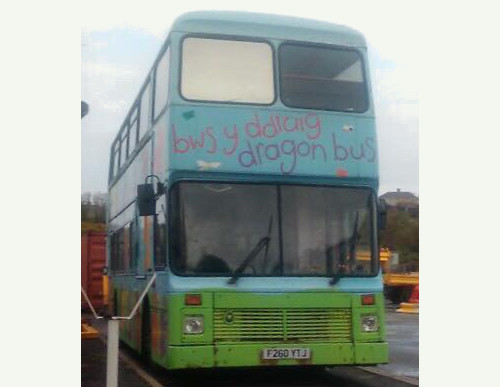
This was the only photo we could find. You’ll just have to imagine the magic inside!
Fast forward a couple of decades to the present day and my life is still very bus-heavy. In fact, the last three years of mine and Alex’s lives have been entirely dedicated to one particular bus.
Three years ago, our housebus idea was born. The idea quickly turned into a goal. And once we have a goal… well, we just go for it. After a couple of years of upskilling and saving every spare cent, last year we finally sold everything, quit our jobs and moved to [what we see as] a slower paced country to live out our hippy dream.
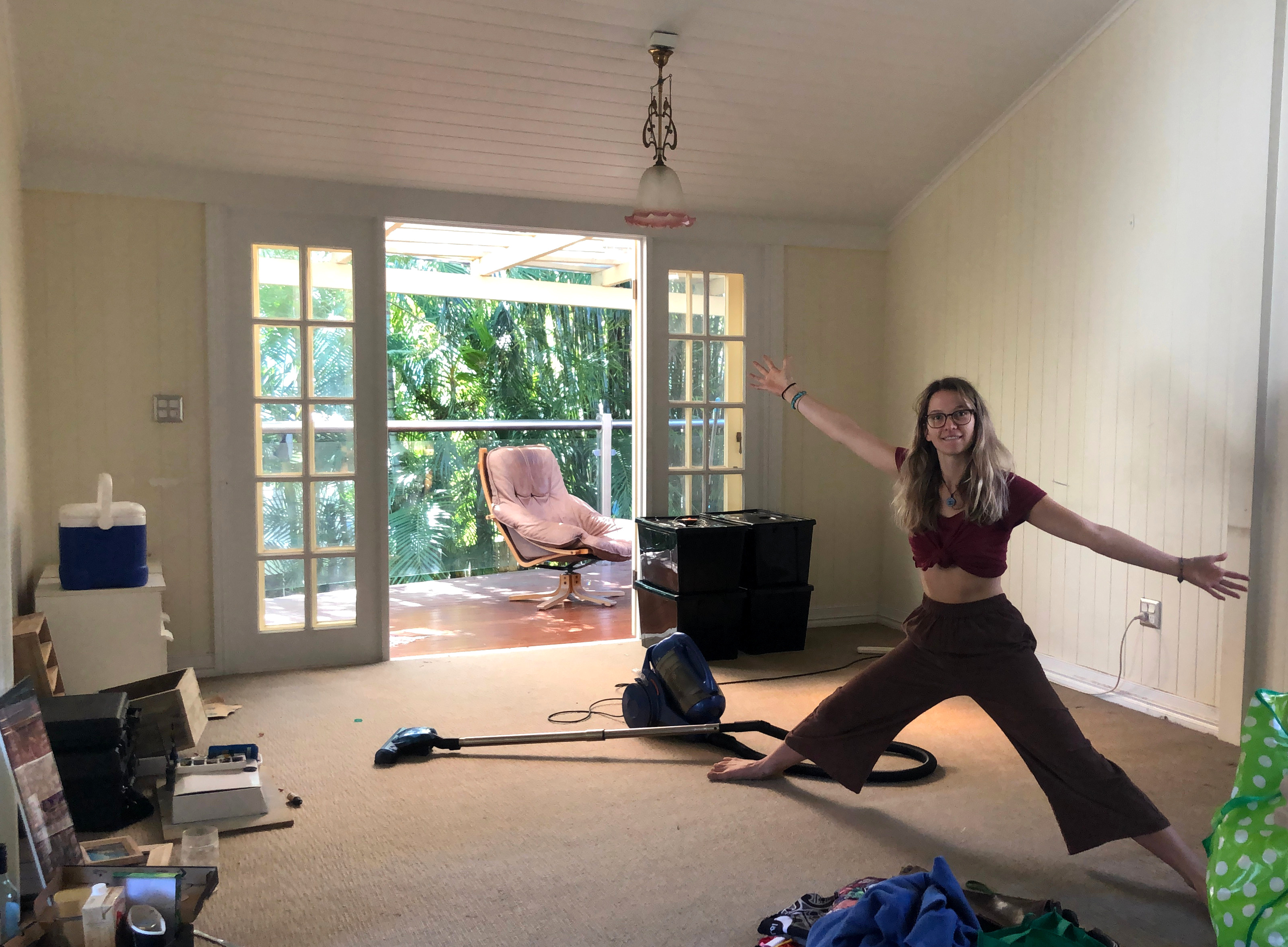 Looking like I’ve lost my marbles because I had in fact lost my marbles. Downsizing from a 5 bedroom house to a bus ain’t easy!
Looking like I’ve lost my marbles because I had in fact lost my marbles. Downsizing from a 5 bedroom house to a bus ain’t easy!
The dream, right?
Well, yes… but also no. It is an absolute privilege to be doing what we’re doing and we will never take it for granted - but it is important to note that it comes with some nightmares too.
Despite what Instagram may tell you, converting a bus isn’t all sunshine and daisies.
There are a million and one positives to this project and everything it entails, but I’m sure you’re all aware of them already. Before you get started, let me share some equally important facts that aren’t as heavily broadcast:
You will injure yourself physically. Even if you are a pro at what you’re doing, when you spend that much time around power tools, with shards of metal & molten steel constantly flying around, you will cause yourself physical pain of some sort. Being two rookies (well, not so much anymore - but definitely not pros) we’ve had our fair share of physical mishaps. Most commonly, metal splinters in hands, feet, even eyes. Also burns - so many burns!
The worst injuries the bus has seen so far have both involved Alex. There was the time he fell off the top of the bus; luckily he’s an excellent faller and rolled his way gracefully out of a broken back. Then there was the time he sliced his knee open with an oversized cutting disk on the angle grinder. He was making an awkward (hence the oversized disk) cut and the disk bit on the frame, and still whizzing-violently, it flung itself towards Alex before he had time to react. It sliced his leg right open, above his knee cap, just missing his quadriceps tendon. We were very lucky it wasn’t worse than it was.
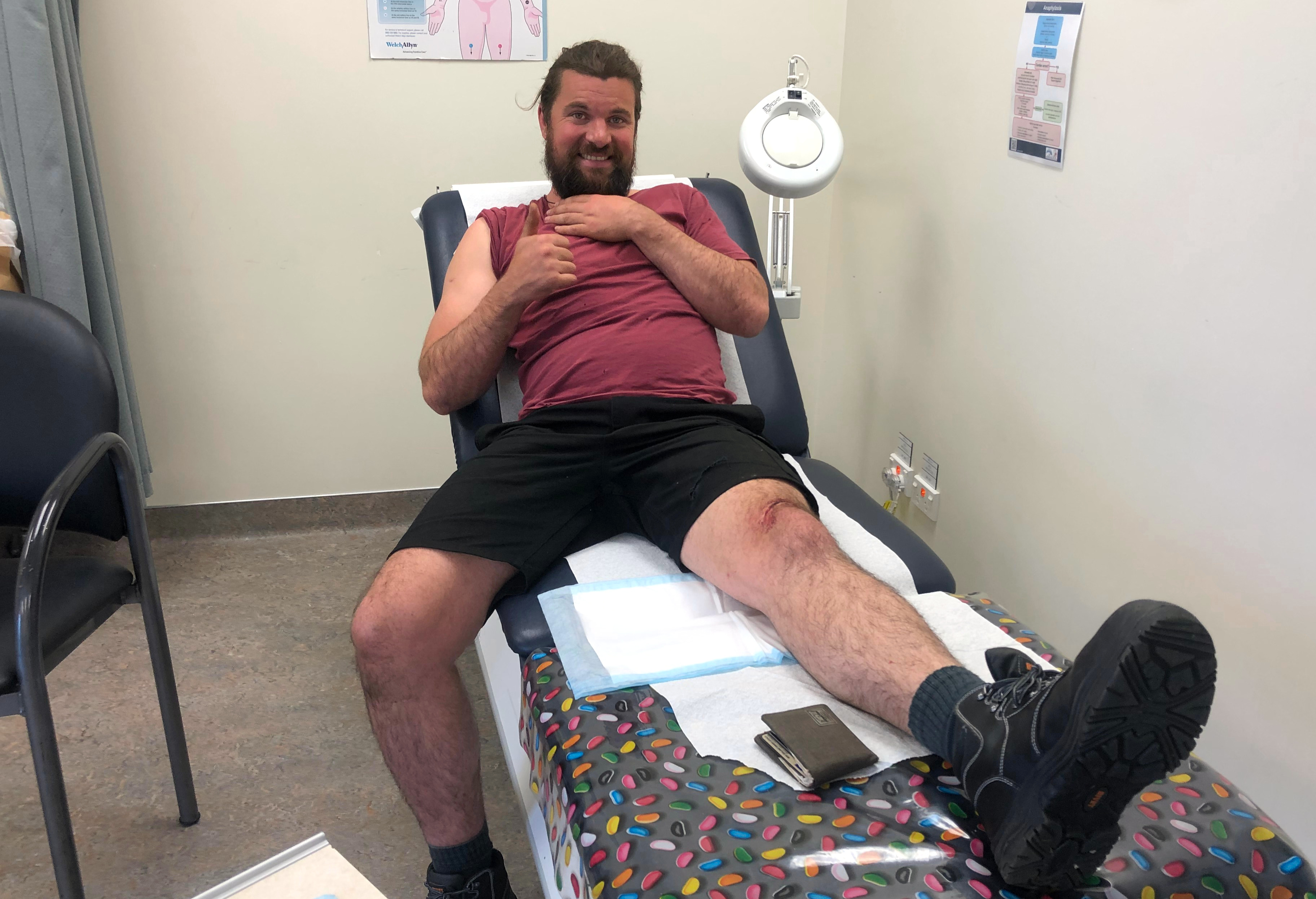 Poor little poppet.
Poor little poppet.
The funny part is that the awkward cut he was making was the final cut that seperated the bus’ roof from its body before the roof raise, and with the wind that had picked up while we were working, there was just no way we could pause the job and nip off to the hospital. We had to reattach the back safely before we went anywhere. So we worked together (Alex welding in the new pieces without moving from his corner, and me making good use of my two working legs and doing everything else) for 4 or 5 hours until the job was done, and then we took poor Alex to the local hospital to be stitched back together.
You will injure yourself emotionally. I was not prepared for this. Physical pain I can handle, but the emotional anguish that comes with this a project of this size - that’s a whole other story. Expect days when you give everything you’ve got, and realise you’ve gone backwards. Expect to feel like a complete idiot when your overworked brain makes a stupid mstake. Expect to question yourself so much that you lose sight of what you’re working for. We have both worked through so many tears on this build (me especially - I’m a crier), and I know there are plenty more to come. Don’t let this scare you, just be aware of it. Take it all one day at a time and it will all feel a lot more manageable. One task at a time, even. The important thing to remember is that you are learning, and mistakes happen when you’re learning - it means you’re improving. Be kind to yourself, and be kind to your building partner.
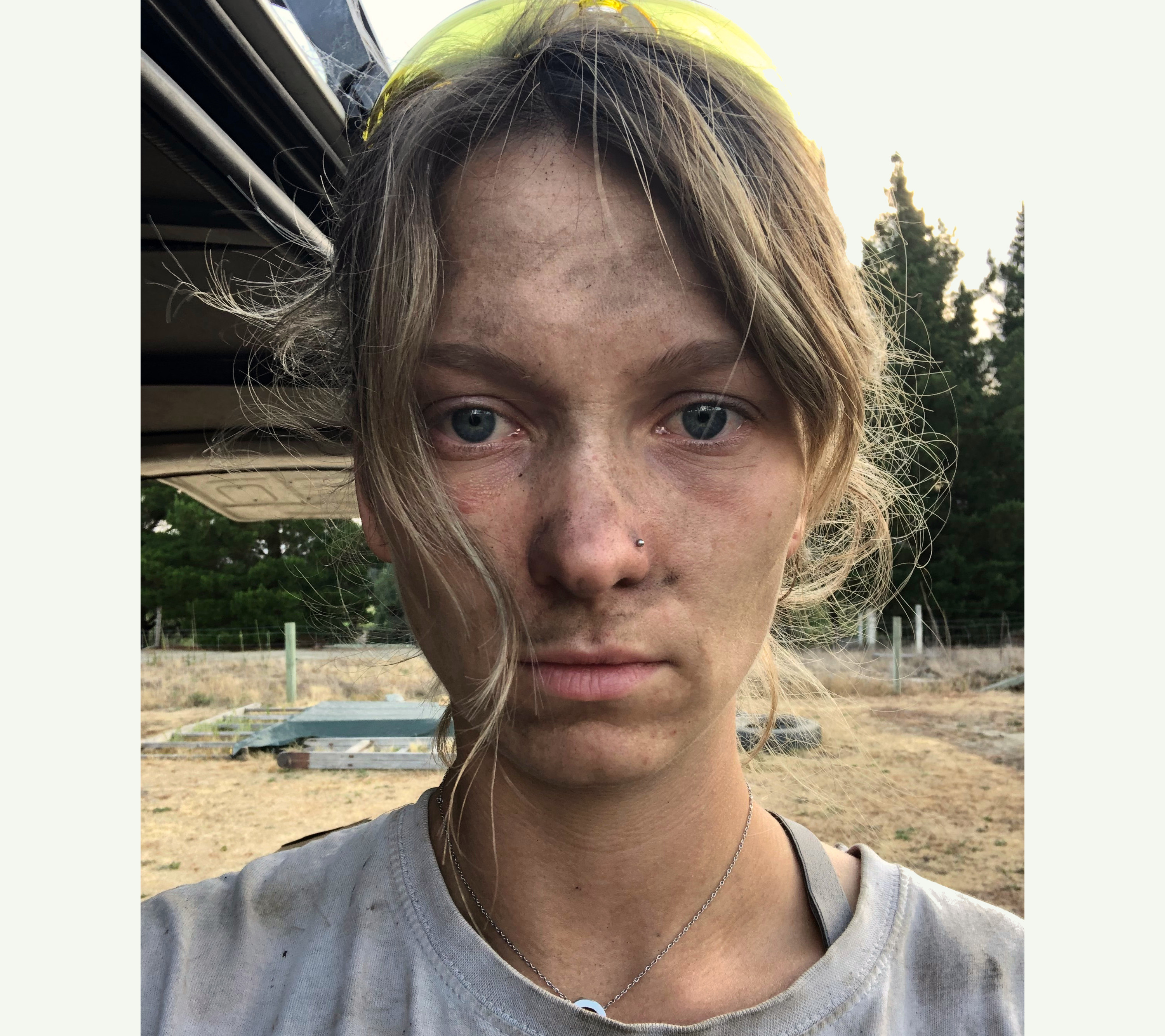 One emotionally injured Bridget.
One emotionally injured Bridget.
You will spend days going backwards without knowing it. A comforting thought is you’ll probably have a great time doing it. You’ll be on a roll, feeling pumped at your progress, blissfully unaware that you’re making future you’s life impossibly difficult. We’ve done this so many times - worked our asses off to find out that we have not only done it wrong, but made ourselves a whole week’s extra work to fix it. I’m afraid we can’t offer you any magical advice to avoid this completely, as you don’t know what you don’t know. I will say that taking the time to properly discuss what you’re trying to achieve and how exactly you’ll achieve it, even if you think it’s a waste of time because you feel you already know, can bring up flaws in your plan before it’s too late, saving a lot of time!
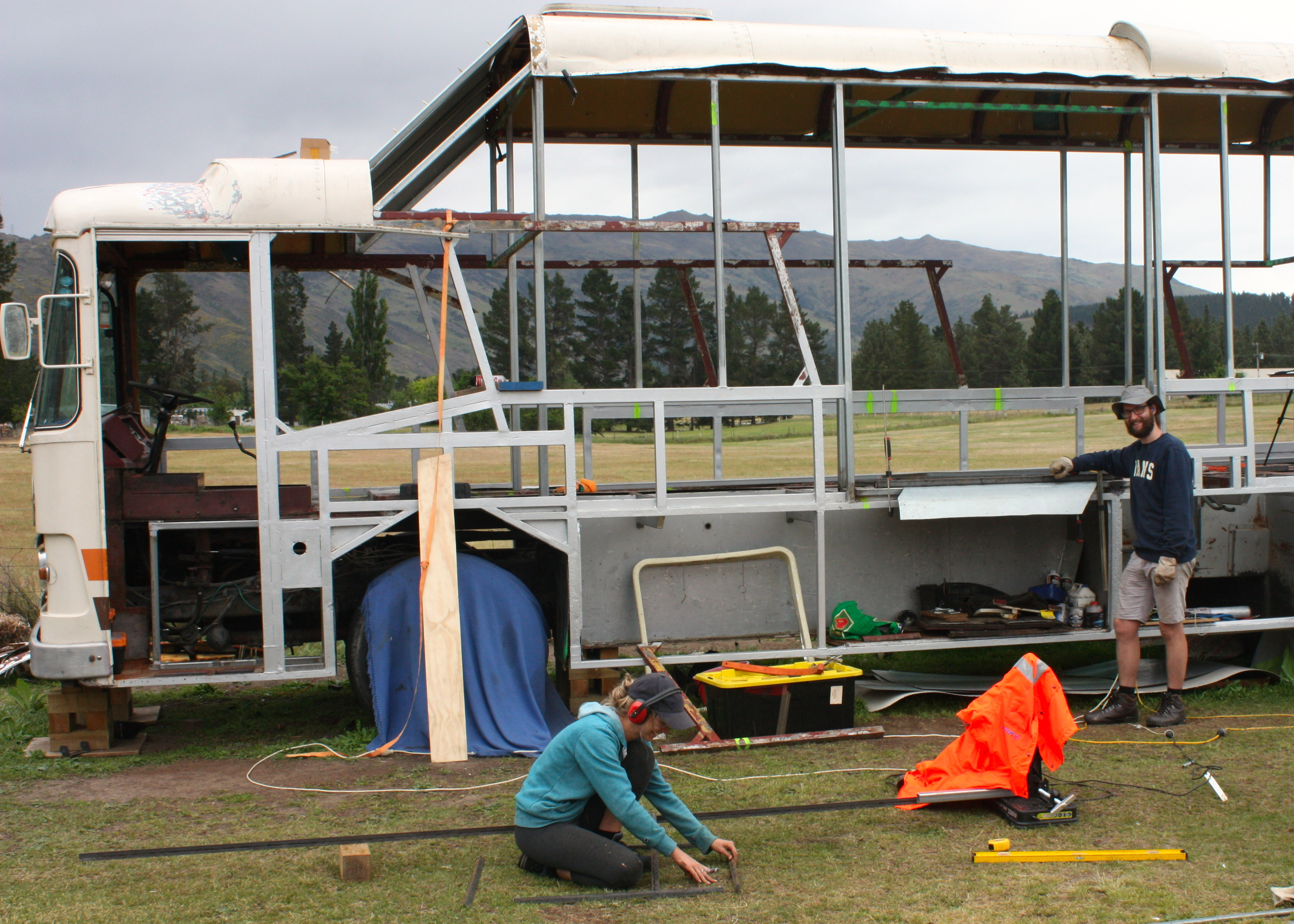 Now we’ve had months to get over it, we can now laugh at how happy both Tom and I look here, both blissfully unaware that we are both actually making mistakes!
Now we’ve had months to get over it, we can now laugh at how happy both Tom and I look here, both blissfully unaware that we are both actually making mistakes!
You will spend countless hours fixing mistakes you’ve made previously, and it will be soul crushing. Going backwards is one thing, but the time you spend fixing these backward steps is just painful! We’ve learnt the hard way that short cuts aren’t for us. If we do ever decide to take one, it’s after an excessive amount of consideration. We’ve learnt that the “right way” is invariably quicker than any short cuts, even if it doesn’t seem that way at the time - ESPECIALLY if you’re new to this kind of work. So please, for us, do it once and do it right.
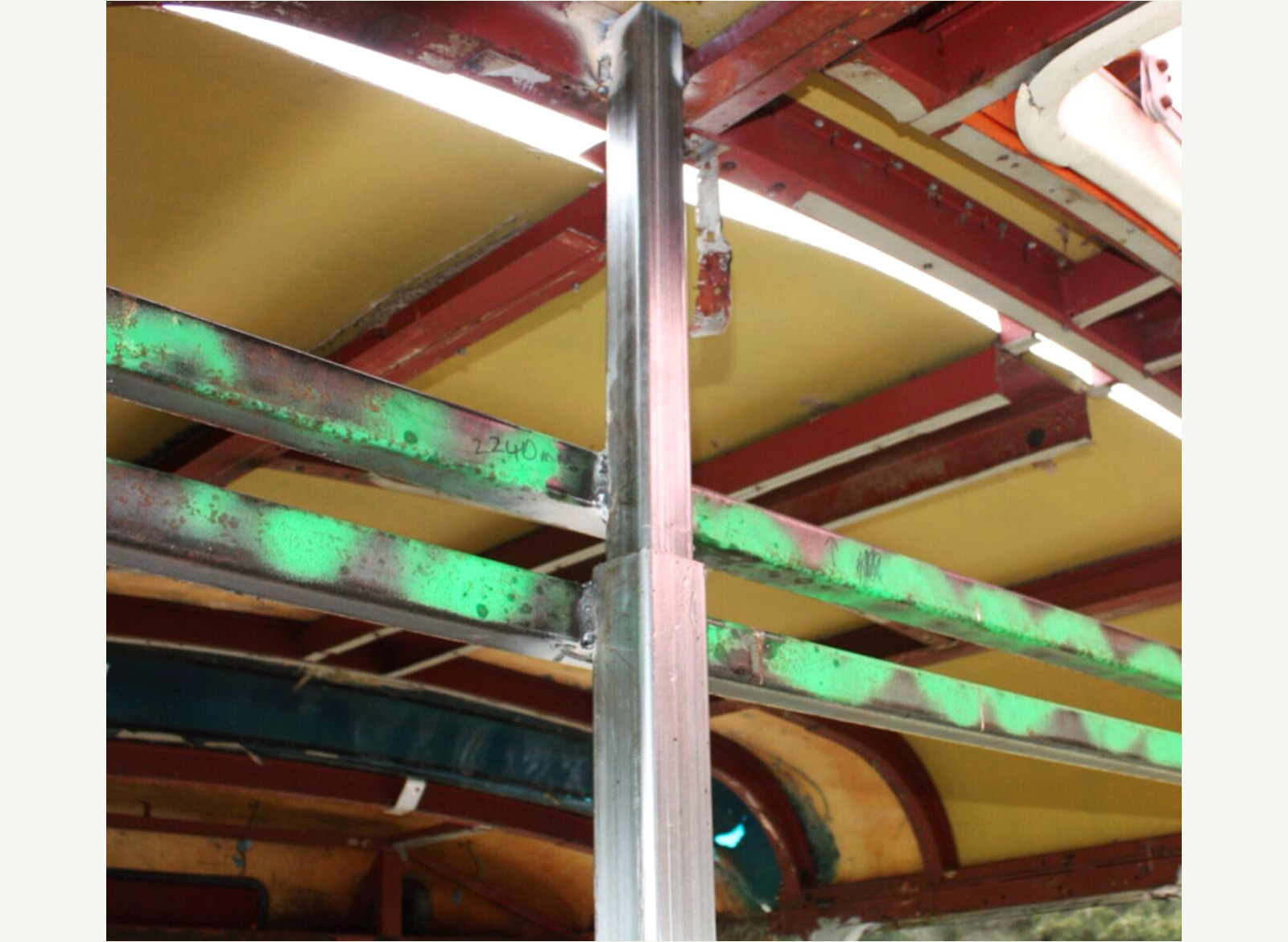 The telescoping mechanism we built for the second (and succesful) attempt at raising the roof. If only we’d just done this the first time!
The telescoping mechanism we built for the second (and succesful) attempt at raising the roof. If only we’d just done this the first time!
Your time off will no longer be free time. It will be research time. Or admin time. It’ll be ordering materials/tools time. Your conversion will consume you, and if you’re not prepared for it, this can be hugely overwhelming. Everyone’s conversion will be different; some people will be lucky enough to dedicate an entire chunk of their lives to it while others will have to work full time and spend only evenings/weekends on it. No matter what your schedule looks like, it is important to factor in one full day off each week, or you’ll find yourself in danger of never stopping (this is not sustainable - we learnt the hard way).
 I find it a lot easier to get into research mode if I have a whiteboard. Anyone else?
I find it a lot easier to get into research mode if I have a whiteboard. Anyone else?
A budget is essential, but be prepared to exceed your budget. The big ticket items like fridges and toilets and whatnot are easy enough to predict. It’s the little things that take you by unwelcome surprise. You’d be surprised how much you end up spending on cutting, grinding & sanding disks, screws, etc. Heck, we’ve spent $200 on rivets. And we’re not even done ordering them! We definitely didn’t budget for that. We’d also anticipated the sheet steel to reskin the bus would be roughly $1000, alas it’s that x3 plus some. We do make up for these losses in other areas, just be prepared for some fluctuation. And it’s ALWAYS a good idea to budget for “shit hitting the fan”. We decided to save twice as much money as we’d predicted we would need - and hopefully we’ll have a nice chunk leftover, but it takes the pressure off a little.
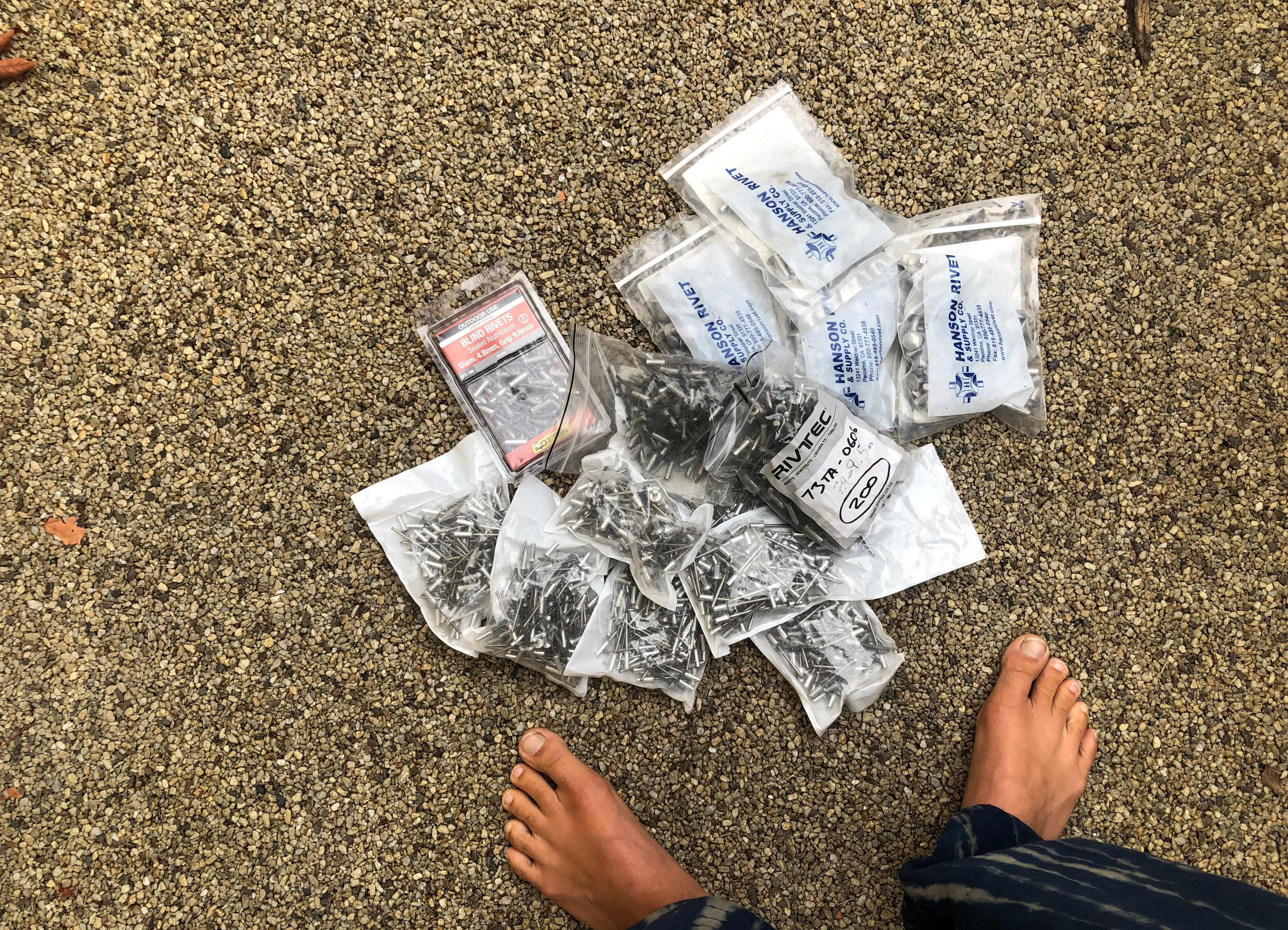 Our rivet collection - and we’re not even done ordering them yet. Such riveting times.
Our rivet collection - and we’re not even done ordering them yet. Such riveting times.
Once you start your build, every Tom, Dick & Harry is an “expert” in building housebuses. We like advice, especially if it’s good advice. We are eternally grateful to everyone who’s gone through their own build and taken the time to share their learnings for no other reason than to make life easier for others. You guys really rock! But it can get a little tedious when you’ve spent the last 3 years reasearching the nitty gritties and a know-it-all twit who actually knows nothing at all tells you that you absolutely must do this this way and that that way. No, no I must not.
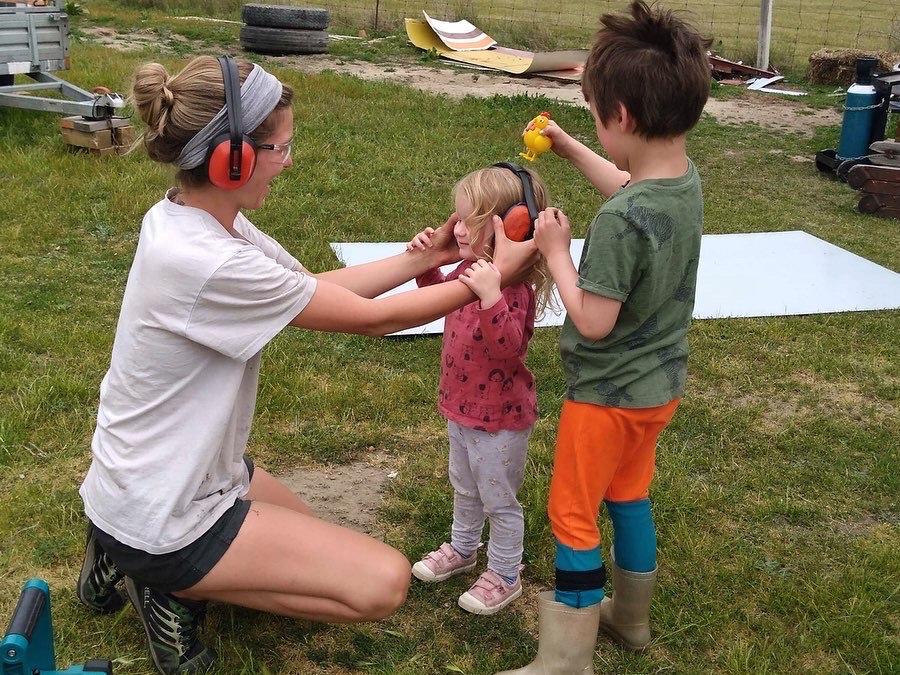 These two cuties had some very… unique ideas on how we should build our bus.
These two cuties had some very… unique ideas on how we should build our bus.
It will most likely take longer than you thought it would. This, we were prepared for. I don’t think either of us have ever completed a personal project in the timescale we anticipated. And being totally honest, we never really wanted to put a timeframe on it. We wanted to build our dream home, taking as long as it took and just enjoying the ride. The problem is that when you tell someone you’re building a housebus, their first question is usually about the timeframe. So we quickly came up with a totally stab-in-the-dark figure - between 6 and 12 months. Six months looked achievable for a while, but then life (in various forms) got in the way and we started to realise it would be closer to twelve months. Although now that the entire globe is on pause, it could be a whole lot longer!
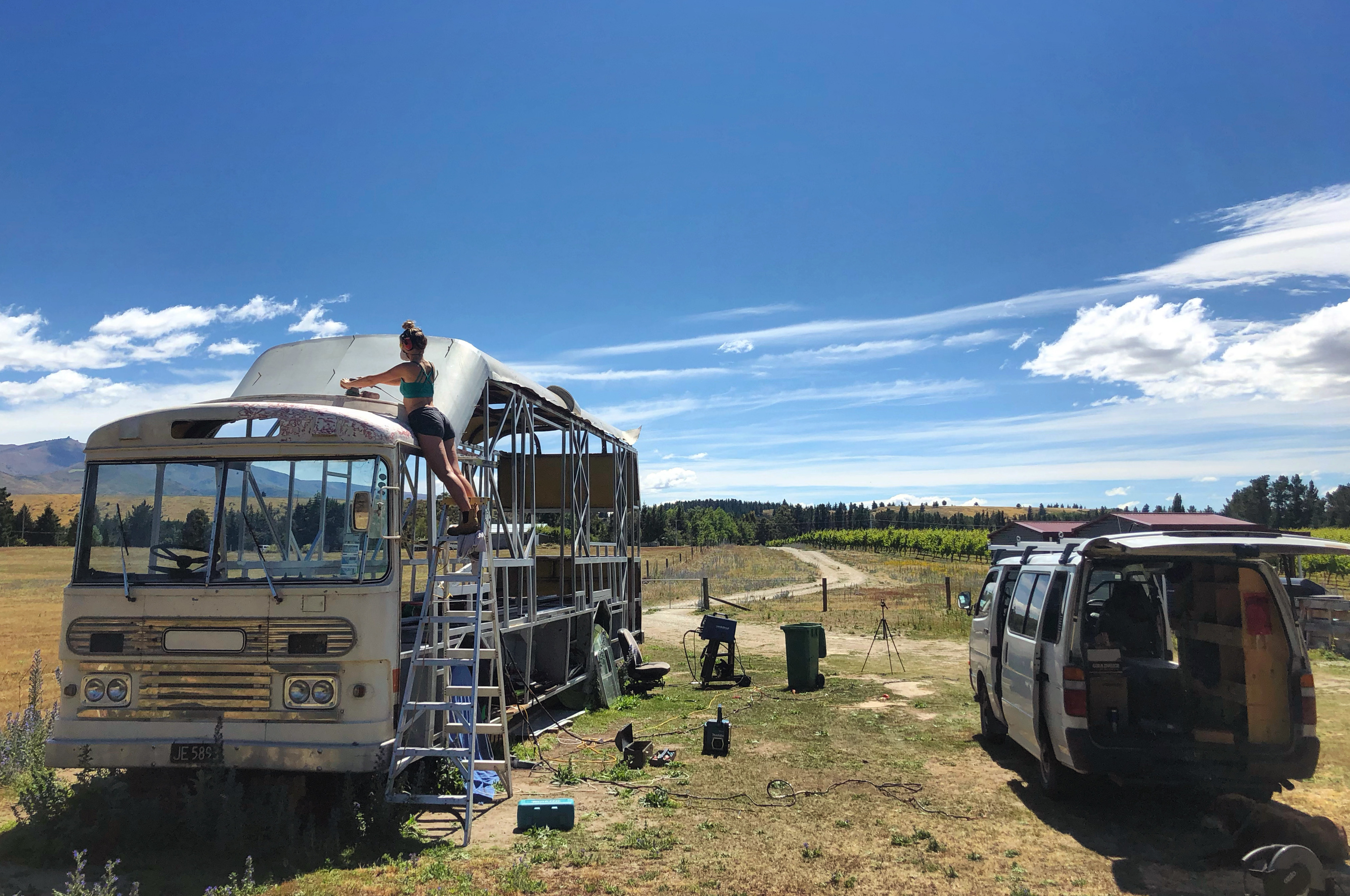 To give you an idea, this is where we’re at approximately six months in.
To give you an idea, this is where we’re at approximately six months in.
Research and preparation is key. You can try and avoid it but you’re just shooting yourself in the foot. It’s a steep enough learning curve as it is, you’ll have enough figuring out on the spot to do to keep you interested, trust me. Do yourself a favour and take the time before you get onsite - even if it’s only the night before - to get clear on what you’re trying to achieve and how you will achieve it. And longer term, before you start your build, as hard as it is to put your dream on hold while you upskill, it really does pay for itself so many times over. I would have blindly jumped straight into this project the moment the idea hatched if it wasn’t for Alex and his (ugh) logical ways, but thankfully he convinced me that we should sit tight for a year (which quickly turned into 2) and try and put ourselves in the best possible position to build our home.
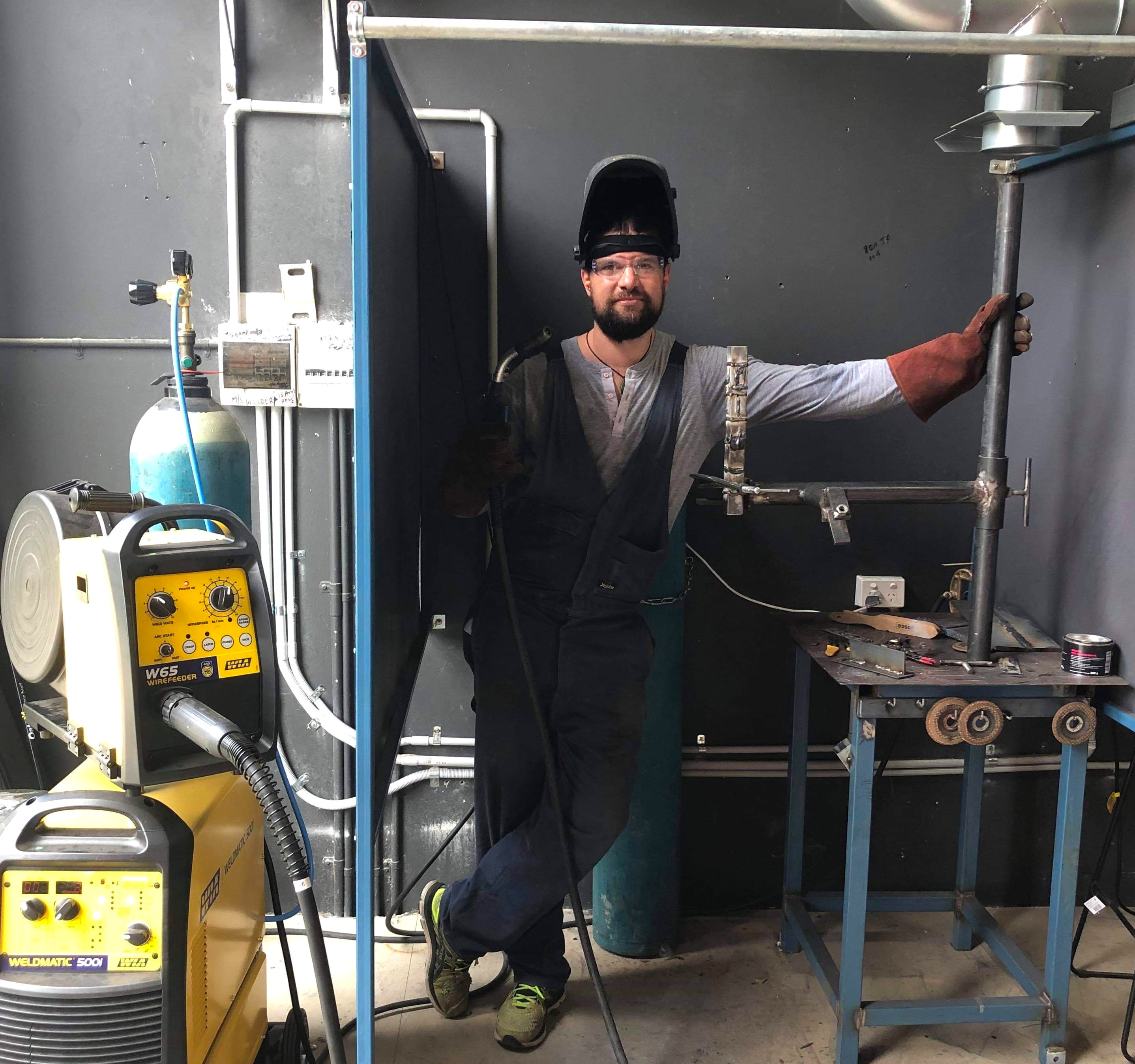 If Alex hadn’t spent his Saturday mornings with Ganesh learning how to weld for a year or so leading up to the build, we’d have been pretty frazzled when we discovered all the rust that needed repairing!
If Alex hadn’t spent his Saturday mornings with Ganesh learning how to weld for a year or so leading up to the build, we’d have been pretty frazzled when we discovered all the rust that needed repairing!
Even with research and prep, it’ll still be HARD. Sorry, it just is. Our build has been so much harder than we ever imagined - even with our years of preparation. But never forget: anything worth doing in this world is incredibly difficult. So don’t let this stop you, let it challenge and inspire you! Just take each day as they come, trust in your research and preparation and roll with the punches.
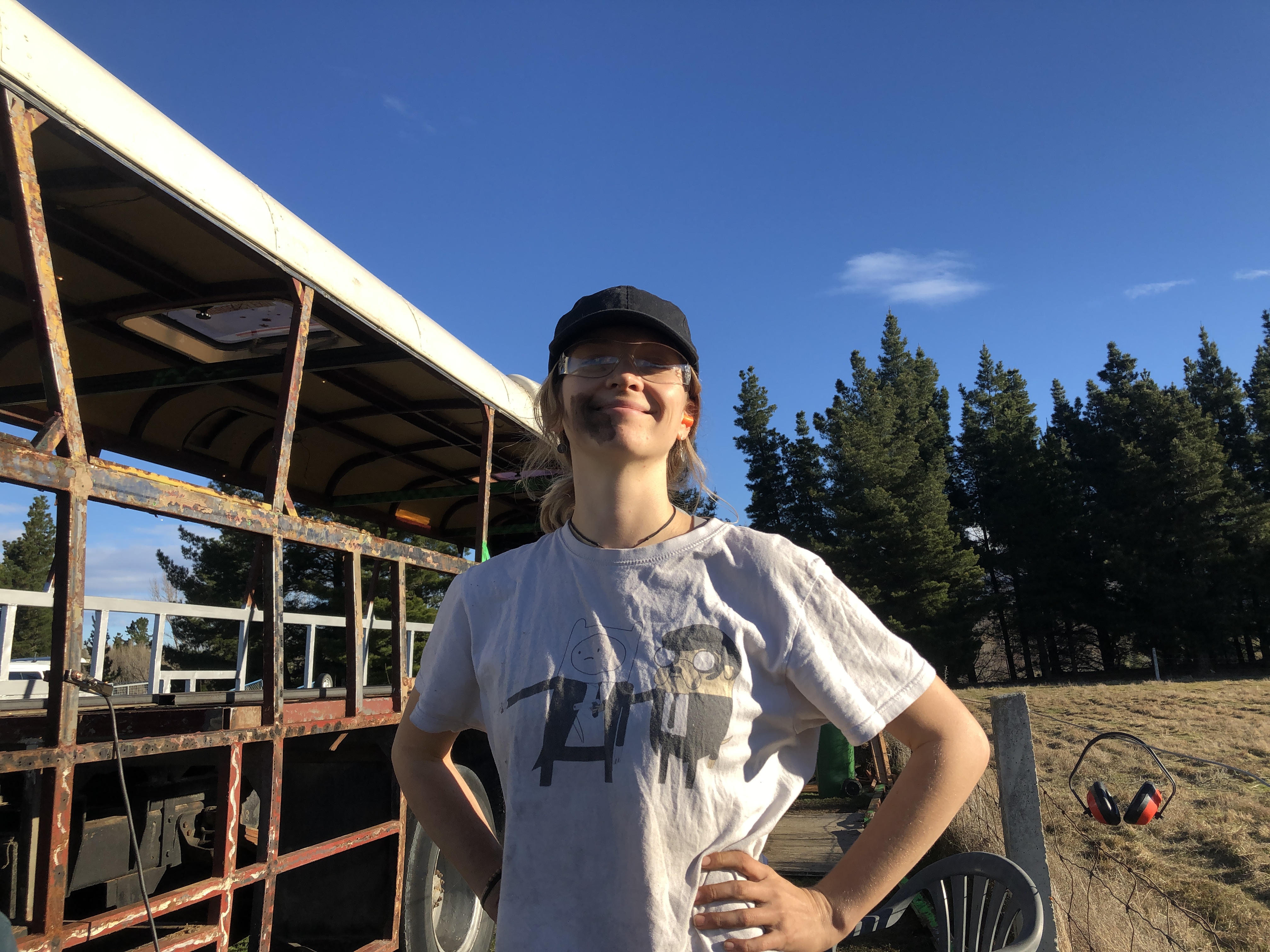 Take it one day at a time and hold your head up high.
Take it one day at a time and hold your head up high.
And on that note, I’m going to stop here because the last thing I want to do it to put anyone off building a Skoolie. No, I just want to share what we have learnt thus far in hope that it might eliminate some unpleasant surprises for you and make the whole journey a bit smoother.
So let’s wrap this up with three more points. I know I said earlier that it’s not all sunshine and daisies, but that’s not to say that there is no sunshine or daisies.
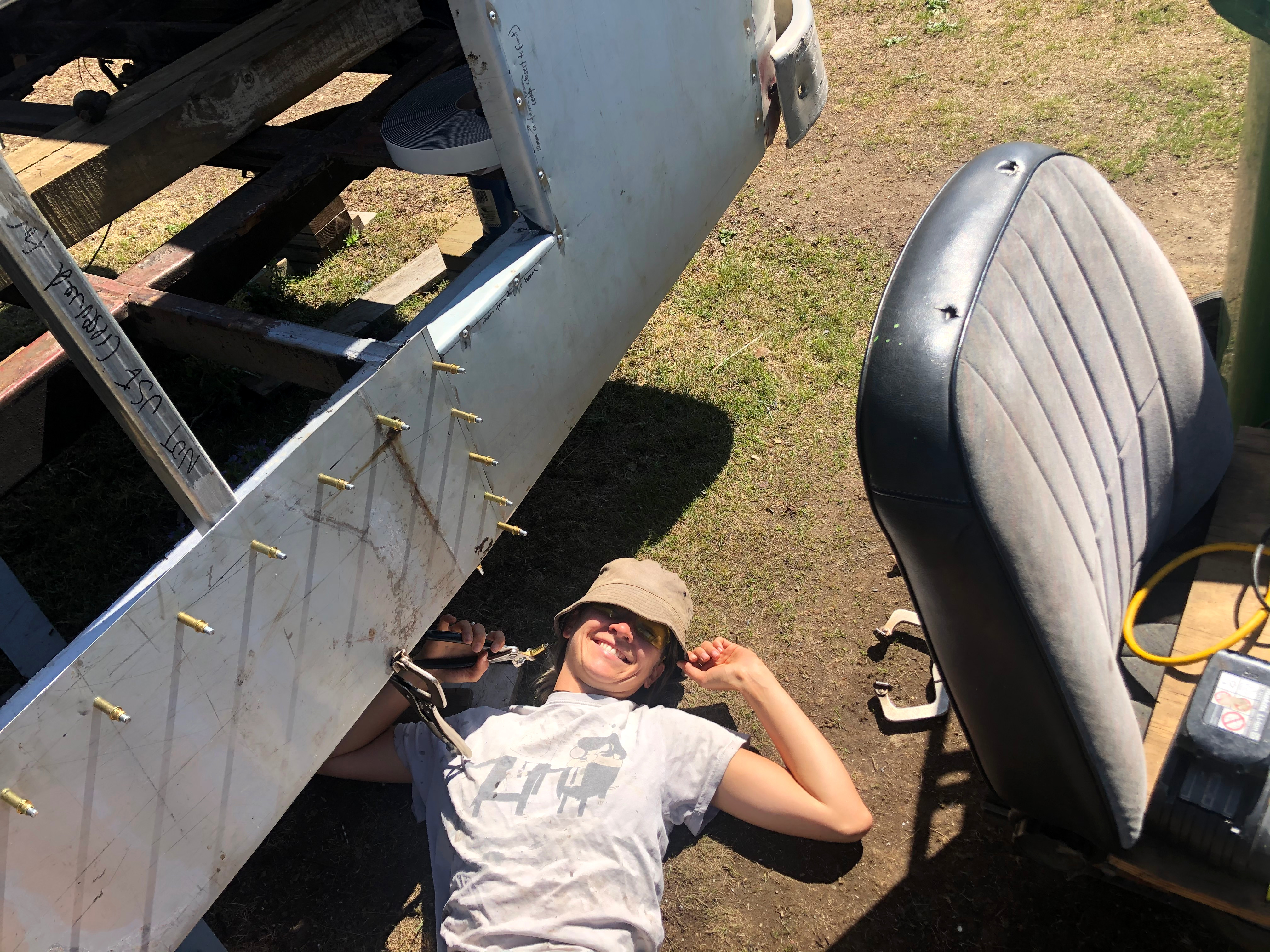 I must be having a good time… look at all those chins!
I must be having a good time… look at all those chins!
Here is our list of the top three things about building our housebus/skoolie:
Your build will attract so many like-minded souls. A bus conversion might seem a bit niche, but the idea of living off-grid, exiting The System and saying goodbye to The Man is something that so many people dream of, and what you’re doing will resonate with a lot of people. We’ve connected with some truly excellent people thanks to this build. And I must say, the love and support we’ve received on social media has been overwhelming! We’ve felt a real sense of community amongst bus lifers, van lifers, tiny homers, and just good people in general. And I swear I’ve made twice as many friends this year as I would have otherwise, just because a bus conversion - especially on this scale - is interesting to most people. There are, of course, the odd few who think you’ve totally lost it (maybe we have), but the vast majority will applaud your courage. It’s a great little ego boost! But what’s important is that you understand that they are right - it IS interesting and it IS inspiring, so soak up all the compliments and well wishes and give yourself a pat on the back!
 Meet Sharon! Sharon lives in her own (beautiful) house truck just outside Christchurch with her fur baby, Chi. She’s a wonderful human being. Find her on instagram @a.girl.a.dog.and.a.truck
Meet Sharon! Sharon lives in her own (beautiful) house truck just outside Christchurch with her fur baby, Chi. She’s a wonderful human being. Find her on instagram @a.girl.a.dog.and.a.truck
You will learn more than you thought possible in such a short space of time. And trust me, that is a truly wonderful feeling. Learning is one of the most exciting things about this world. The sense of satisfaction you get when you step back to admire your work and think, “I would have had no idea how to do this 6 months ago!” is hugely inspiring. For me personally, I have recently noticed a massive shift in how I treat myself and how I approach new ventures. I’ve never had any confidence whatsoever in myself or my abilities, but learning so many new skills and achieving so much on this project has changed my mindset completely. I now get excited about the possibility of trying new things, rather than feeling anxious that I will fail. It has given me the confidence to back myself, in anything and everything. If I want to do something , I will do it. And if I don’t know how to do it, I will learn! And honestly, this shift in perspective has been life changing.
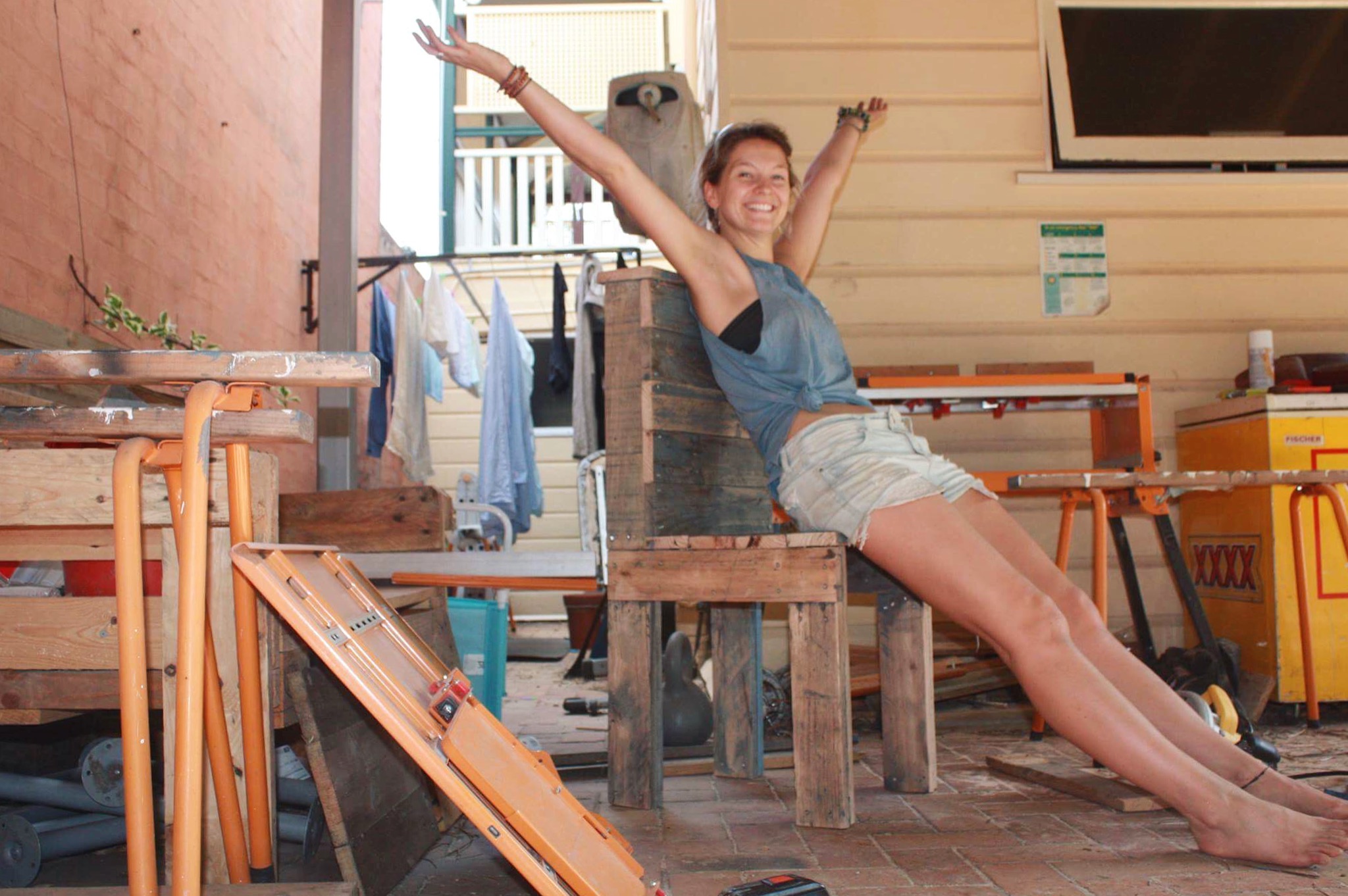 Okay so it’s not the best looking chair you’ve ever seen, but that’s not the point. Learning new skills is bloody exciting!
Okay so it’s not the best looking chair you’ve ever seen, but that’s not the point. Learning new skills is bloody exciting!
The build will be a truly unforgettable experience, a memory to cherish forever. Everyone always talks about “bus life” referring to the experiences you have once your house bus is built. But no one talks about the journey leading up to this point. Yes it’s probably one of the hardest things you’ll ever do, but it’s such a special experience - an experience that not many people have the privilege of knowing. When you’re grey and old and are reminiscing on your front skoolie porch about how you got to where you are today, your past struggles will be remembered as inspiring challenges, and you will smile that you had the guts to say no to what you were told your were supposed to do and followed your dream instead.
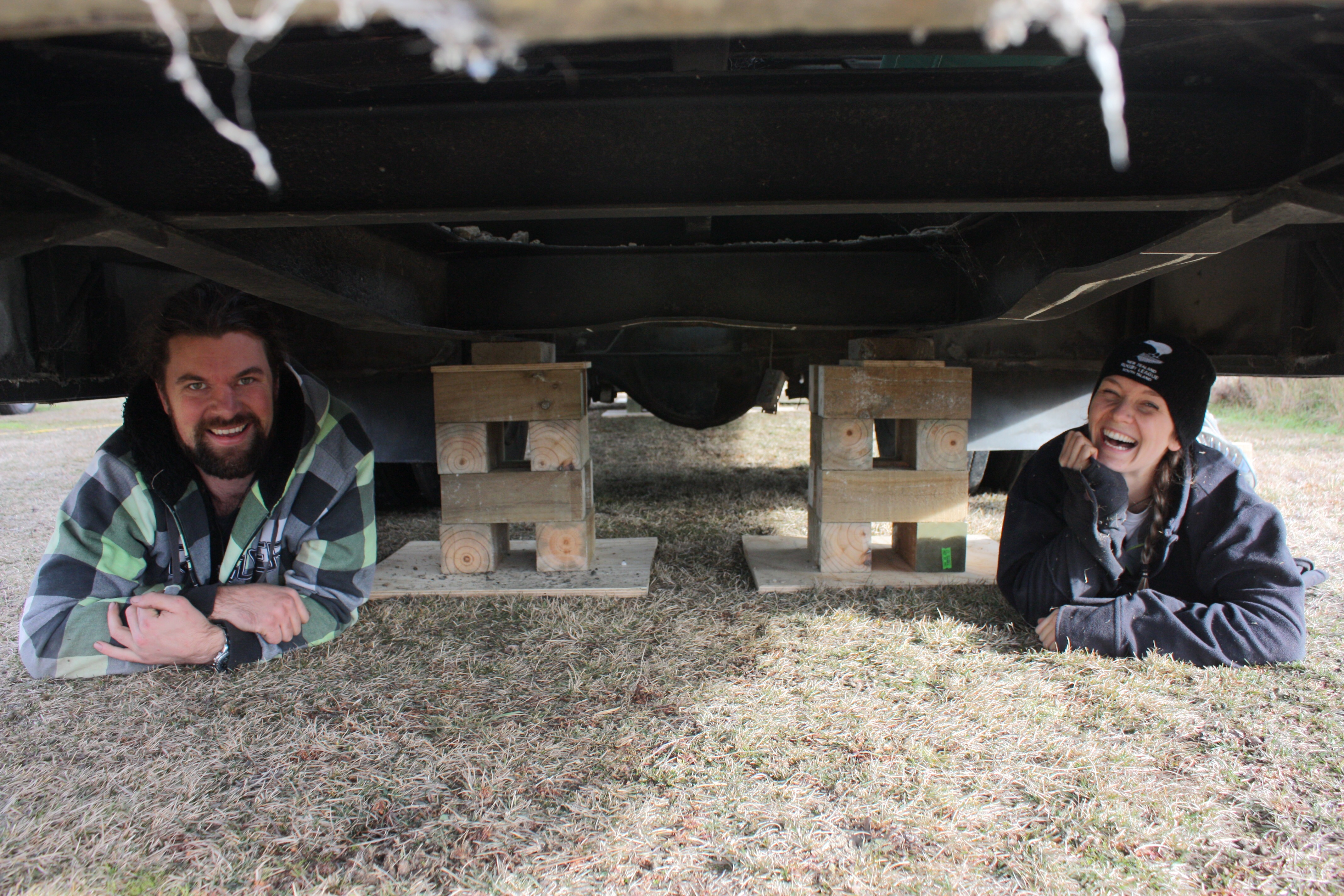 It really has been a crazy ride so far, and we look forward to the craziness still to come!
It really has been a crazy ride so far, and we look forward to the craziness still to come!
I think that’s it from me for today. I hope I haven’t scared anyone away from building a house bus. It’s not something you should be afraid of doing, but a little preparation will make the process a whole lot easier!
If you have any questions, please do not hesitate. Ask away in the comments, find us on social media, send us an email…. heck, write us a letter if you really want to. We aim to write and publish more blog posts over the next few months, detailing the build and hopefully giving you some insights that could help you on your build.
In the meantime, look after yourselves, look after your loved ones, and always remember to be kind.
Bridget xoxo
